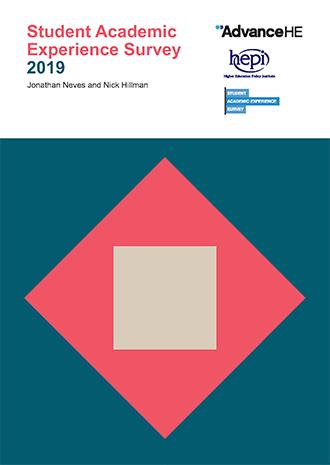The Student Academic Experience Survey, published jointly by Advance HE and the Higher Education Policy Institute (HEPI), has over the past 13 years proved to be one of the most reliable and topical barometers of student opinion, focusing specifically on the experiences of undergraduates studying in the UK.

While some areas of the survey such as value for money and how fees are spent tend to capture the headlines, the survey provides a great deal of insight into the quality of teaching and assessment across the sector, and crucially how important these aspects are in driving perceptions of the overall experience.
At a headline level, there has been an encouraging increase in perceptions of value for money, from 38% to 41%. This consolidates the increase we saw in 2018, and continues to reverse the consistent decline experienced between 2012 and 2017. So what lies behind this increase? Probing further, the data tells us that the quality of teaching is the main aspect that students were thinking about if they said they received good value – underlining the importance of good teaching among all the other aspects of the experience measured in the survey.
Encouragingly, there are improved perceptions of teaching across the board in 2019. In particular, teaching staff are recognised as clearly explaining course goals and requirements, and using contact hours to guide independent study, as well as being helpful and supportive, and we can reasonably infer that these improved perceptions have contributed strongly to the improved view of value.
The survey also addresses a variety of measures on assessment, which have also improved across the board. In particular, staff are rated highly for giving general feedback on progress (beyond discussion of marks) and commenting on draft work. In several of these aspects the 2019 score is the highest achieved in recent years, which is a very strong result.
Despite the good news on teaching (and assessment), not all students feel the same way, and in particular we continue to see some worrying differences in teaching quality by ethnicity. On each and every aspect, students from BME (Black and Minority Ethnic) backgrounds are significantly less likely to be satisfied with teaching quality. Moreover, while the perceptions among White students have improved slightly year on year, the picture among the BME cohort is more mixed, with some aspects actually declining between 2018 and 2019. The results also point towards BME students being less satisfied with their access to members of staff.
These findings do not necessarily reflect a difference in how White and BME students are taught, but instead reveal differences in perception, and potentially in expectations. We know from wider sector work that BME students are highly likely to engage in their course, [1] but these results tell us that broadly they do not get as much out of the teaching they receive. In the context of a widely recognised BME attainment gap these differences in perceived teaching quality are a clear concern.
Potential reasons for these differences in perception have been put forward, such as staff demographics not reflecting student characteristics, but these results, and their consistency over time, point towards a need to understand these differences in a lot more detail in order to begin to address them.
Student fees are never far from the news, not least in light of the recent recommendation from the Post-18 review of education and funding that student fees should be reduced to £7,500 per year[2]. One of the key areas of our survey asks students how they feel their fees should be spent, and it is striking to see how this underlines the importance of teaching. The single most appropriate way of spending fees, according to students, is on investing in teaching facilities (60% of students mention this), closely followed by student support services (58%), campus development (54%) and another teaching-related aspect – the investment in teaching staff (51%). By contrast, other aspects such as investment in research staff, sports facilities or careers services are not seen as being such priorities.
Building on these insights into the vital role played by high quality teaching, Advance HE’s Annual Teaching and Learning Conference 2019 (2 – 4 July) will position the spotlight firmly on teaching in a global context, in particular this year the conference will explore innovation for teaching excellence focusing on innovative teaching practices and pedagogies and seeking to uncover new practice which demonstrates or contributes to teaching excellence and is improving the student experience.
Read more about the Advance HE annual conference and the Student Academic Experience Survey.
[1] Jonathan Neves (2018), UK Engagement Survey. York: Advance HE
[2]Source:https://assets.publishing.service.gov.uk/government/uploads/system/uploads/attachment_data/file/805127/Review_of_post_18_education_and_funding.pdf [Accessed 11 April 2019]